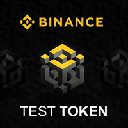-
 Bitcoin
Bitcoin $96,453.1917
0.14% -
 Ethereum
Ethereum $2,762.2415
2.98% -
 XRP
XRP $2.5550
-1.52% -
 Tether USDt
Tether USDt $1.0002
0.03% -
 BNB
BNB $666.6500
2.44% -
 Solana
Solana $171.0093
-0.63% -
 USDC
USDC $1.0001
0.00% -
 Dogecoin
Dogecoin $0.2450
0.63% -
 Cardano
Cardano $0.7733
-0.29% -
 TRON
TRON $0.2383
-0.36% -
 Chainlink
Chainlink $17.7324
0.66% -
 Avalanche
Avalanche $25.6812
2.10% -
 Sui
Sui $3.4386
2.28% -
 Stellar
Stellar $0.3318
0.92% -
 Litecoin
Litecoin $126.8191
-2.19% -
 Toncoin
Toncoin $3.7638
4.77% -
 Shiba Inu
Shiba Inu $0.0...01556
2.41% -
 Hedera
Hedera $0.2147
-1.82% -
 UNUS SED LEO
UNUS SED LEO $9.7016
-0.28% -
 MANTRA
MANTRA $8.9910
20.19% -
 Hyperliquid
Hyperliquid $24.2671
-2.95% -
 Polkadot
Polkadot $5.0680
-1.95% -
 Bitcoin Cash
Bitcoin Cash $321.4985
1.43% -
 Bitget Token
Bitget Token $4.9827
1.83% -
 Ethena USDe
Ethena USDe $0.9997
0.18% -
 Uniswap
Uniswap $9.0289
1.93% -
 Dai
Dai $1.0002
0.02% -
 Monero
Monero $235.1303
1.37% -
 NEAR Protocol
NEAR Protocol $3.4724
2.46% -
 Pepe
Pepe $0.0...09532
3.22%
What is the block generation time of UNI coin?
Unlike traditional cryptocurrencies, UNI coin stands out due to its non-minable nature, opting instead for fair distribution and liquidity mining to reward participants contributing to the Uniswap ecosystem's liquidity.
Feb 18, 2025 at 06:49 pm

UNI Coin: Block Generation Time, Mining, and Other Key Aspects
Key Points:
- UNI coin is not mineable, it has no block generation time.
- UNI is the native token of the Uniswap decentralized exchange (DEX).
- UNI holders can participate in governance of the Uniswap protocol.
- UNI's token distribution is transparent and fair.
What is UNI Coin?
UNI coin is the native token of the Uniswap decentralized exchange (DEX). Uniswap is a leading DEX that allows users to trade Ethereum-based tokens without the need for a centralized intermediary. UNI coin grants holders governance rights over the Uniswap protocol, allowing them to participate in decisions that affect the future of the exchange.
Block Generation Time of UNI Coin
UNI coin is not mineable, meaning that there is no block generation time associated with it. Instead, UNI coins are distributed through a fair and transparent process that ensures the equitable distribution of tokens among participants.
Mining UNI Coin
As mentioned above, UNI coin is not mineable. Mining is a process used to validate transactions on a blockchain and create new blocks. Since UNI is not based on a blockchain, it does not require mining. Instead, UNI tokens are generated and distributed through a process called liquidity mining.
Liquidity Mining for UNI
Liquidity mining is a method of distributing cryptocurrency tokens to users who provide liquidity to a DEX. In the case of Uniswap, users can provide liquidity by depositing two different tokens into a liquidity pool. In return for providing liquidity, users are rewarded with UNI tokens. The amount of UNI tokens earned is proportional to the amount of liquidity provided.
Token Distribution
The distribution of UNI tokens is transparent and fair. The total supply of UNI is 1 billion tokens, and the distribution is as follows:
- 60% allocated to the Uniswap community
- 21.51% allocated to Uniswap team members
- 17.8% allocated to investors
- 0.69% allocated to advisors
Governance
UNI holders have governance rights over the Uniswap protocol. They can vote on proposals that affect the future of the exchange, such as changes to the fee structure, the addition of new tokens, and the development of new features.
FAQs
Q: How can I acquire UNI coins?
A: UNI coins can be acquired by participating in liquidity mining on the Uniswap DEX or by purchasing them on a cryptocurrency exchange.
Q: What are the benefits of holding UNI coins?
A: Holding UNI coins provides holders with governance rights over the Uniswap protocol and allows them to participate in decisions that affect the future of the exchange.
Q: Is UNI coin a good investment?
A: The investment potential of UNI coins depends on a variety of factors, including the overall cryptocurrency market, the performance of the Uniswap DEX, and the demand for governance rights.
Disclaimer:info@kdj.com
The information provided is not trading advice. kdj.com does not assume any responsibility for any investments made based on the information provided in this article. Cryptocurrencies are highly volatile and it is highly recommended that you invest with caution after thorough research!
If you believe that the content used on this website infringes your copyright, please contact us immediately (info@kdj.com) and we will delete it promptly.
- 2024 Crypto Report: Bitcoin Stable, Ethereum Declines, Niche Tokens Rally
- 2025-02-23 10:05:26
- NoLimitCoins Casino Promo Code NLSFA: Claim 1.35M GC and 6,100 SC in February 2025
- 2025-02-23 09:45:26
- Bitcoin (BTC) Struggles to Break Above $98K, Faces Resistance at Key Trendline
- 2025-02-23 09:45:26
- DOGE Millionaires Eyeing DTX Exchange: The Future of Crypto
- 2025-02-23 09:25:25
- Bybit CEO Ben Zhou said that the exchange will try all available means to get the stolen funds back
- 2025-02-23 09:25:25
- How to Make Money on Binance by Writing, Making Videos, and Referring Friends
- 2025-02-23 09:25:25
Related knowledge
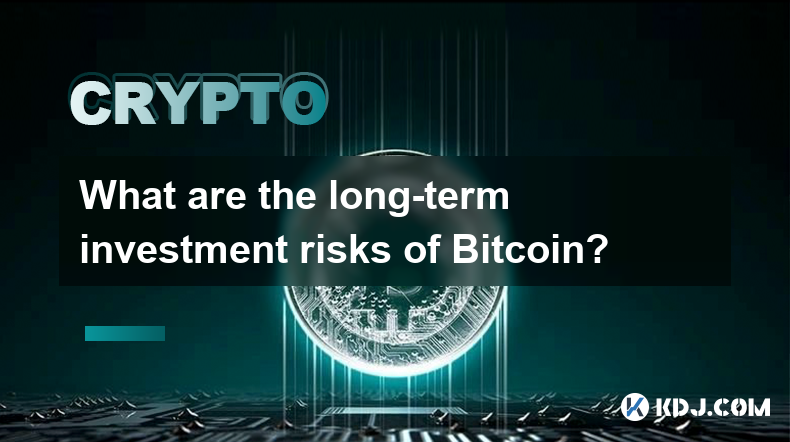
What are the long-term investment risks of Bitcoin?
Feb 22,2025 at 05:30pm
Key PointsVolatility and price fluctuationsRegulatory uncertaintySecurity risksCompetition from altcoinsMarket manipulation and scamsTransaction feesEnvironmental concernsLong-Term Investment Risks of BitcoinVolatility and Price FluctuationsBitcoin's high volatility is a double-edged sword. While it has the potential to generate substantial returns, it ...
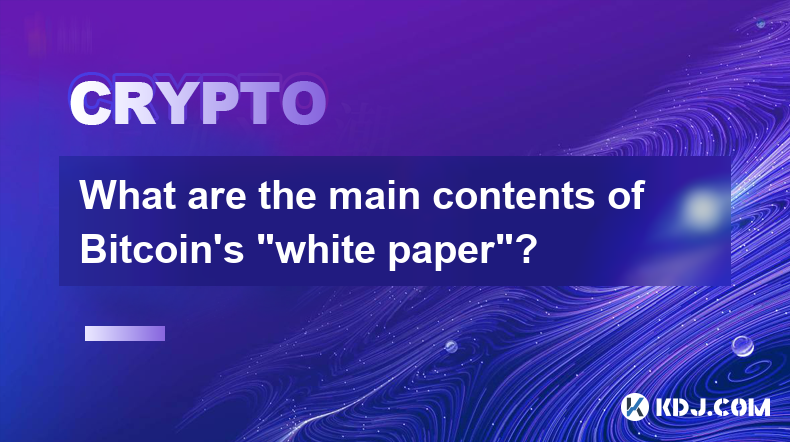
What are the main contents of Bitcoin's "white paper"?
Feb 21,2025 at 04:36am
Key Points:Understanding Bitcoin's Genesis: The White Paper's IntroductionA Decentralized Digital Currency: Bitcoin's Core ConceptBlockchain Technology: The Foundation of Bitcoin's Immutable LedgerProof-of-Work: Securing Bitcoin's NetworkThe Design of Bitcoin's Currency: Issuance, Scarcity, and DivisibilityBitcoin's Potential Applications and Future Pro...

How does Bitcoin's distributed ledger ensure consistency?
Feb 22,2025 at 10:06pm
Key Points:Bitcoin employs a distributed ledger, also known as a blockchain, to maintain a tamper-proof and consistent record of transactions.The blockchain is a decentralized network of computers that collectively validate and store transaction data.Bitcoin's distributed ledger ensures consistency through consensus mechanisms and cryptographic algorith...
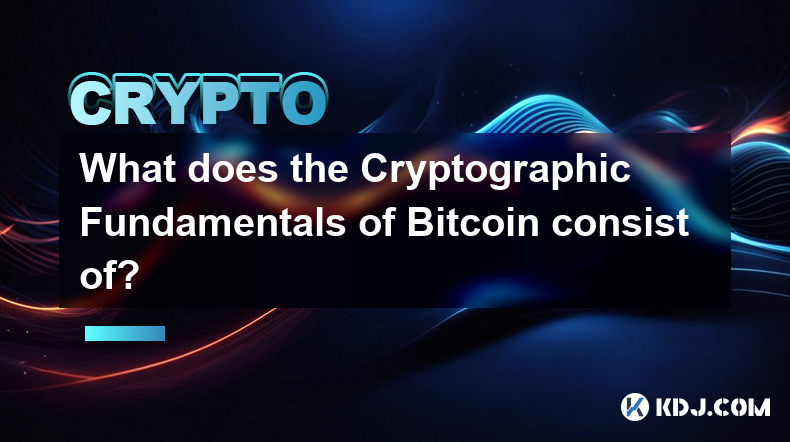
What does the Cryptographic Fundamentals of Bitcoin consist of?
Feb 21,2025 at 12:06pm
Key PointsUnderstanding the cryptographic algorithms used in BitcoinFamiliarization with the Bitcoin blockchain and its underlying mechanicsExamination of the security measures that protect Bitcoin from attackAnalysis of the decentralized nature of Bitcoin and its implicationsDiscussion of the scalability and transaction fee issues associated with Bitco...

What is Bitcoin's relationship with blockchain technology?
Feb 22,2025 at 07:00pm
Bitcoin's Intertwined Relationship with Blockchain TechnologyKey Points:Definition of blockchain technology and its decentralized natureBitcoin's utilization of blockchain for secure and immutable transactionsThe role of blockchain in verifying and confirming transactionsEvolution of blockchain technology beyond Bitcoin's cryptocurrency applicationsUnde...
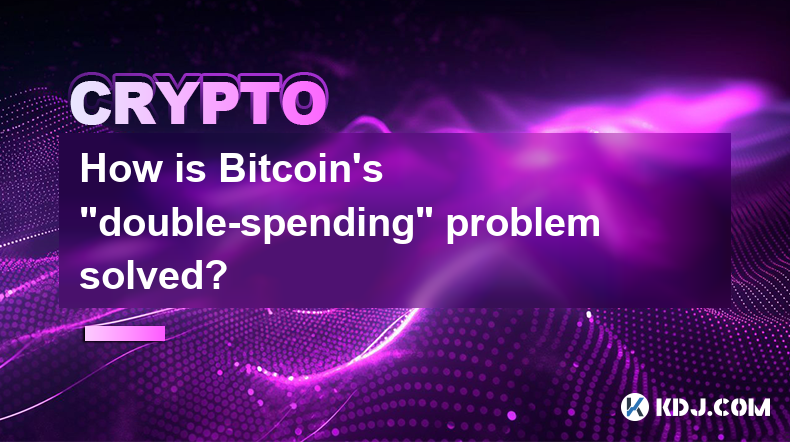
How is Bitcoin's "double-spending" problem solved?
Feb 23,2025 at 02:54am
Key Points:The double-spending problem refers to the potential for a digital currency transaction to be reversed, allowing the same funds to be spent multiple times.Bitcoin solves this problem through the use of a decentralized blockchain, a public ledger that records all transactions permanently and securely.The immutability and transparency of the blo...

What are the long-term investment risks of Bitcoin?
Feb 22,2025 at 05:30pm
Key PointsVolatility and price fluctuationsRegulatory uncertaintySecurity risksCompetition from altcoinsMarket manipulation and scamsTransaction feesEnvironmental concernsLong-Term Investment Risks of BitcoinVolatility and Price FluctuationsBitcoin's high volatility is a double-edged sword. While it has the potential to generate substantial returns, it ...

What are the main contents of Bitcoin's "white paper"?
Feb 21,2025 at 04:36am
Key Points:Understanding Bitcoin's Genesis: The White Paper's IntroductionA Decentralized Digital Currency: Bitcoin's Core ConceptBlockchain Technology: The Foundation of Bitcoin's Immutable LedgerProof-of-Work: Securing Bitcoin's NetworkThe Design of Bitcoin's Currency: Issuance, Scarcity, and DivisibilityBitcoin's Potential Applications and Future Pro...

How does Bitcoin's distributed ledger ensure consistency?
Feb 22,2025 at 10:06pm
Key Points:Bitcoin employs a distributed ledger, also known as a blockchain, to maintain a tamper-proof and consistent record of transactions.The blockchain is a decentralized network of computers that collectively validate and store transaction data.Bitcoin's distributed ledger ensures consistency through consensus mechanisms and cryptographic algorith...

What does the Cryptographic Fundamentals of Bitcoin consist of?
Feb 21,2025 at 12:06pm
Key PointsUnderstanding the cryptographic algorithms used in BitcoinFamiliarization with the Bitcoin blockchain and its underlying mechanicsExamination of the security measures that protect Bitcoin from attackAnalysis of the decentralized nature of Bitcoin and its implicationsDiscussion of the scalability and transaction fee issues associated with Bitco...

What is Bitcoin's relationship with blockchain technology?
Feb 22,2025 at 07:00pm
Bitcoin's Intertwined Relationship with Blockchain TechnologyKey Points:Definition of blockchain technology and its decentralized natureBitcoin's utilization of blockchain for secure and immutable transactionsThe role of blockchain in verifying and confirming transactionsEvolution of blockchain technology beyond Bitcoin's cryptocurrency applicationsUnde...

How is Bitcoin's "double-spending" problem solved?
Feb 23,2025 at 02:54am
Key Points:The double-spending problem refers to the potential for a digital currency transaction to be reversed, allowing the same funds to be spent multiple times.Bitcoin solves this problem through the use of a decentralized blockchain, a public ledger that records all transactions permanently and securely.The immutability and transparency of the blo...
See all articles










































































